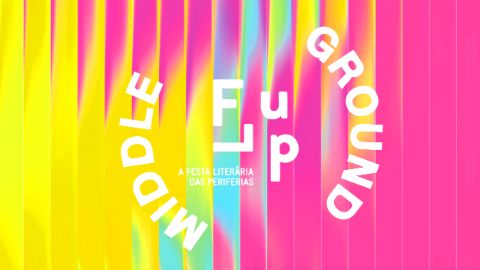Middle Ground: Festa Literária das Periferias
Escrevivência: Literatures from Brazil and the Diasporas
Literature Festival: Readings, Discussions, Workshops, Keynote Lectures, Performances, Concert, DJ Set, Open Mic Night
10 & 11 October 2025

Middle Ground: Festa Literária das Periferias
The term ‘middle ground’ does not denote a fixed geographical place but a metaphorical position that holds space for complexity, contradiction, in-betweenness, and care. Inspired by Chinua Achebe’s idea of the middle ground as a position of doubt, make-believe, and the unpredictable, every year, Haus der Kulturen der Welt (HKW) invites literature festivals from around the world to Berlin to explore and expand literary and oral practices and networks. At a time of deepening divisions and polarization, Middle Ground turns to literatures and oraltures not for answers, but for solidarity.
In 2025, for its third edition, Middle Ground partners with Festa Literária das Periferias (FLUP), a festival born in the favelas of Rio de Janeiro, to ask: what does it mean to write from the experience of rupture? Here, rupture is understood as being both geographical and deeply metaphorical, referring not only to the fissure of landscapes but also languages, memory, and the fault lines they leave behind. In Brazilian literature, rupture is often articulated through the legacy of colonial violence, forced migration, the transatlantic trade of enslaved people, and the fragmentation and erasure of Afro-Brazilian and Indigenous narratives across time and space.
Since its founding in 2012 by writers Julio Ludemir and Ecio Salles (1969–2019), FLUP has worked against Brazil’s hegemonically structured literary field by making room for voices and communities that have been historically ignored. FLUP champions favela-based writers and those from the peripheries, and lends a particular focus on Black, Indigenous, and female literary perspectives. Across thirteen editions, the festival has been held in parts of Rio de Janeiro long excluded from Brazil’s ‘mainstream’ cultural map, such as Morro dos Prazeres, Vigário Geral, Mangueira, and Babilônia, reclaiming these sites as stages for literary and cultural exchange. FLUP creates links between emerging writers from these contexts and established authors, and has featured book launches and performances with authors and artists such as Bernardine Evaristo, Yanick Lahens, Bethania Nascimento, Teju Cole and Akua Naru. FLUP treats learning as a tool for literary and political self-determination by organizing workshops that magnify marginalized voices and create spaces where collective storytelling becomes a form of resistance, as well as fostering new voices through its publishing programme, and hosting regular poetry slams. Eschewing a definition of literature only pertaining to the written word, FLUP’s activities also encompass music and performance, for example through samba circles led by local groups like Awurê, whose rhythms, like literature, draw upon ancestral memory. This collaboration with Middle Ground at HKW continues FLUP’s work as a space for writers and their work to be seen, and to remain in conversation with those who came before.
This tradition of challenging erasure runs deep in the works of Afro-Brazilian women writers such as Conceição Evaristo, Léila Gonzalez, Beatriz Nascimento, and Leda Maria Martins, among others. For Evaristo, storytelling is not simply narrative; it is survival, a radical act of presence in the aftermath of historical violence. She coined the term escrevivência, a neologism merging the Portuguese words for ‘writing’ (escrita) and ’experience’ (vivência), to describe a literary practice inseparable from lived reality. ‘I conceive [my writing] from my position as a Black woman’, Evaristo explains. ‘My fictionalization can only come from the place where I stand. And I stand in my place as a Black woman in Brazilian society, in my place as a poor woman in Brazilian society’.[1] Escrevivência is more than a literary method; it is a political and epistemological stance that refuses to separate life from language, memory from text, or identity from authorship. Through it, Evaristo asserts that voice is inseparable from position.
Drawing upon escrevivência, where life and language merge inseparably, this edition of Middle Ground creates space for the messy, complicated truth of writing from lived experiences. Among other events and activations, the festival features two keynotes: Leda Maria Martins explores the connection between embodied knowledge and Afro-indigenous epistemologies, while Conceição Evaristo expands on how escrevivência confronts gaps in history and memory. Elsewhere in the programme, a roundtable entitled Writing Against the Map with Vinicius Jatobá, Amara Moira, and Luciany Aparecida explores how writers across different genres subvert dominant narratives. As in previous editions, creative writing workshops invite authors to gain from the experience from the visiting contributors while also engaging more deeply with thematic concerns of the festival. This year’s programme also welcomes the radiant energy of Bia Ferreira, whose music transforms the stage into a space of joy, resistance, and unapologetic presence. One of the most beloved moments of the festival is the Open Mic Night, where poets, storytellers, and wanderers of language bring their voices to life. This year, the theme ‘Voice, Echo, and Location’ invites reflections on how migration and orality shape individuals and communities, weaving stories that move between Brazil and the rest of the world. The 2025 festival also celebrates two forthcoming books born from previous Middle Ground collaborations with PREE (2023) and the Hargeysa International Book Fair (2024), carrying voices and relationships that have travelled across continents. HKW has also collaborated with Cluster of Excellence 2020 Temporal Communities on the publication Cinco vozes da literatura brasileira contemporânea. Fünf Stimmen der zeitgenössischen brasilianischen Literatur, which gathers new translations of five contemporary Brazilian writers published in German for the first time.
[1] Franciane Conceição Silva, ‘Insurgent Voices: A Panorama of Afro-Brazilian Writing’ Words Without Borders, translated by Bruna Dantas Lobato (1 December 2018), www.wordswithoutborders.org/read/article/2018-12/december-2019-afro-brazilian-panorama-of-afro-brazilian-literature-francy. In footnote 7, Silva cites the YouTube video ‘The Starting Point of Writing – Conceição Evaristo Occupation (2017)’. YouTube, uploaded by Itaú Cultural (22 March 2018), www.youtube.com/watch?v=3CWDQvX7rno.